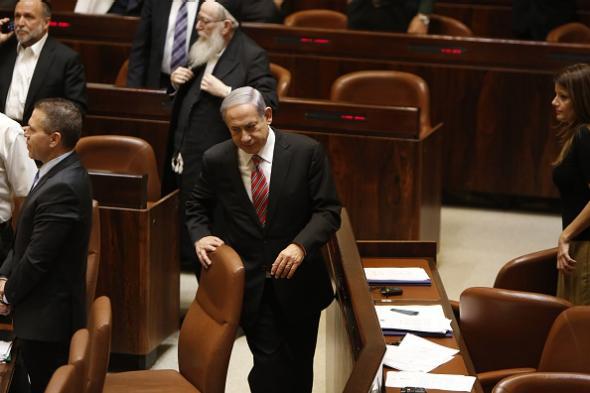Israeli Prime Minister Benjamin Netanyahu attacked Tuesday’s nuclear agreement between Iran and six world powers even before it was formally announced, calling the deal a “bad mistake of historic proportions” that will create a terrorist nuclear threat. From Haaretz:
“Far-reaching concessions were made in areas that were supposed to prevent Iran from acquiring nuclear weapons,” Netanyahu said. “Iran will receive hundreds of billions of dollars, with which it can fuel its terror machine, and pursue its aggression and terror in the region and the world.”
The Washington Post quotes more of the Israeli leader’s critical rhetoric:
“Iran is going to receive a sure path to nuclear weapons,” said Prime Minister Benjamin Netanyahu Tuesday. “Many of the restrictions that were supposed to prevent it from getting there will be lifted.”
With the lifting of economic sanctions, Netanyahu warned, “Iran will get a jackpot, a cash bonanza of hundreds of billions of dollars, which will enable it to continue to pursue its aggression and terror.”
Netanyahu’s belief that negotiations with Iran are a mistake has been long known—he said Tuesday the threat of Iranian belligerence is “the most crucial issue of the State of Israel’s future and security” and has said in the past that “the year is 1938 and Iran is Germany.” The Obama regime’s allegedly disastrous policy toward Iran was the central subject of a controversial address to Congress that Netanyahu gave in March after accepting Speaker John Boehner’s invitation to speak without notifying the White House. The Post, however, says that despite the denouncements Israel’s dependence on U.S. support and aid means unilateral action against Iran is unlikely:
“It goes without saying that an agreement prevents Israel from thinking about a military option, unlike the options that might have existed five or ten ago,” said Uzi Rabi, director of the Moshe Dayan Center for Middle Eastern and African History at Tel Aviv University … “The only thing Netanyahu has left is to continue talking,” said Yoel Guzansky, former head of the Iran desk at Israel’s National Security Council.
In what the New York Times calls a “a rare display of Israeli consensus,” the country’s opposition leaders have denounced the deal just as strongly as Netanyahu. “The agreement is terrible,” said Tzipi Livni of the center-left Zionist Union. Labor leader Isaac Herzog (whose bid to become prime minister failed in March elections) said that he plans to fly to the U.S. to lobby against the deal (which, despite opponents’ rhetoric, is unlikely to be vulnerable to congressional action because the White House is defining it as an executive agreement rather than a treaty). “With regard to security, I am more extreme than Netanyahu,” Herzog said.
